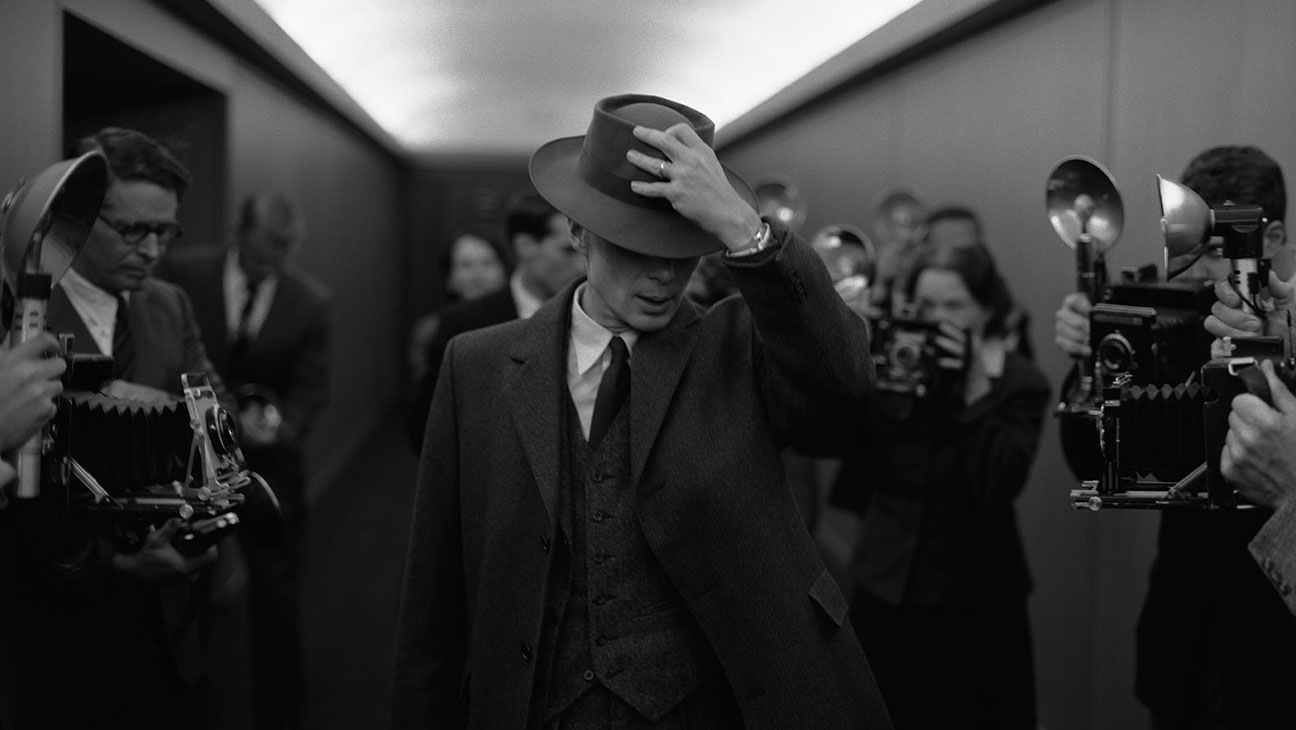As dense as a black hole, Oppenheimer condenses hundreds of pages from American Prometheus into a single film, filled with enough recognizable actors to populate a small town. Even at three hours, the drama doesn’t waste a moment, keeping the audience rapt for its entirety. Christopher Nolan’s adaptation narrows the scope of the doorstop biography and largely focuses on two periods in the wildly interesting life of J. Robert Oppenheimer, known as the “father of the atomic bomb.” Yet those two periods are momentous enough to have shaped not only Oppenheimer, but also the broader world. The centerpiece is, unsurprisingly, the atomic bomb testing by the Oppenheimer-led Manhattan Project in 1945, but Nolan places equal weight on the 1954 hearing that found the physicist’s loyalty to the United States in question during the Red Scare. Nolan gives both events their due in this film that is both challenging and immensely entertaining.
That seeming dissonance is one of many in Oppenheimer, especially as it depicts the man himself, played by Cillian Murphy. The key theme echoes quantum superposition, the principle that a particle can be in two places at the same time. Similarly, Nolan’s film posits that people can be two opposing things at once: Robert Oppenheimer is a genius who is naive to the workings of the world, a theoretical physicist whose signature discovery wreaks a massive physical impact on the world, and the creator of the nuclear bomb who only wants peace. No one here is purely good or evil, and Nolan’s film is neither a hagiography nor a condemnation of this controversial figure. Oppenheimer is decidedly anti-atomic bomb (in case you were wondering), but its take on its primary subject is more nuanced.
Murphy is surrounded by literally dozens of recognizable actors; listing everyone whose face you know would consume my entire word count (and confound my editor). Most significant are Emily Blunt doing a crisp Mid-Atlantic accent as his wife, Kitty, also a study in contradictions; Robert Downey Jr. as Lewis Strauss, the prickly chairman of the Atomic Energy Commission; and Matt Damon as Leslie Groves, the gruff general presiding over the Manhattan Project. But Oppenheimer has a deep bench, with special shout-outs deserved by Florence Pugh in a small role as Jean Tatlock, Robert’s troubled lover; David Krumholtz as Isidor Rabi, his friend and fellow scientist; and Alden Ehrenreich as a senate aide. Most characters get just a line or two, and keeping all of them straight is an intellectual feat roughly on level with grasping the basics of quantum physics.
In theory, Oppenheimer is the type of biographical drama that most people would feel fine waiting months to see on their TV at home. Yet even beyond the wide scope of his characters and story, Nolan challenges the idea of the traditional biopic, making it an immediate must-see on the big screen. The format — particularly in the ideal 70mm IMAX — showcases the massive scale of the bomb tests and magnifies quantum particles to the size of a tennis court. However, it also showcases these detailed performances, allowing the audience to see actors like Murphy practically under a microscope, showcasing every pore and even the smallest of facial expressions. Every scene somehow feels simultaneously epic and intimate at this size, whether it’s a pillar of fire or a conversation held around a conference table.

Oppenheimer is Nolan’s longest film, and in many ways, it’s his most ambitious. Though more structurally straightforward than Tenet, it refuses the traditional biopic route of telling Robert’s story in linear fashion. Instead, though it primarily focuses on his Manhattan Project years and his later security clearance struggles, it also offers glimpses of other key moments in his life as well as the senate confirmation hearing of Downey’s Strauss, bouncing between these times with speed and ease. Nolan shifts between black-and-white and color cinematography, changing film stock and aspect ratios frequently; the only constant is that it’s consistently gorgeous.
Select moments lack subtlety, and some of the metaphors are rendered a little too clearly. Yet Nolan requires so much of the audience with this epic drama that it’s a forgivable sin to occasionally make things a little easy on them. But as much as Nolan asks of the viewer, he provides equal rewards. What may be most remarkable in this film about the making of the atomic bomb is the humor woven throughout, as well as the warmth. Oppenheimer the man may not have always understood the people around him, but Oppenheimer the movie is full of humanity and real emotion.
Nolan rarely misses, and Oppenheimer is the director working at his best in a film with big explosions and even bigger ideas. This is a complex look at a complicated man, but Oppenheimer unequivocally establishes that this is a story worth telling—and that Nolan was the perfect filmmaker to do it.
A-
“Oppenheimer” is in theaters today.



